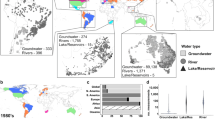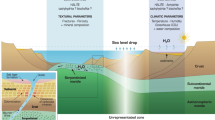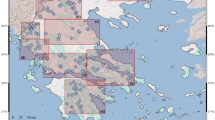Abstract
IN a recent communication Swallow and Crease1 directed attention to the existence of a basin about 200 m deep at the bottom of the Red Sea near 21° 17′ N., 38° 02′ E., filled with highly saline water at a temperature of more than 44° C. The present communication gives a brief preliminary account of the chemical composition of this water.
This is a preview of subscription content, access via your institution
Access options
Subscribe to this journal
Receive 51 print issues and online access
$199.00 per year
only $3.90 per issue
Buy this article
- Purchase on Springer Link
- Instant access to full article PDF
Prices may be subject to local taxes which are calculated during checkout
Similar content being viewed by others
References
Swallow, J. C., and Crease, J., Nature, 205, 165 (1965).
Morris, A. W., and Riley, J. P., Deep Sea Res., 11, 899 (1964).
Charnock, H., Nature, 203, 591 (1964).
Author information
Authors and Affiliations
Rights and permissions
About this article
Cite this article
BREWER, P., RILEY, J. & CULKIN, F. Chemical Composition of the Hot Salty Water at the Bottom of the Red Sea. Nature 206, 1345–1346 (1965). https://doi.org/10.1038/2061345a0
Issue Date:
DOI: https://doi.org/10.1038/2061345a0
This article is cited by
-
Hydrographic Observations of the Red Sea Brines
Nature (1967)
-
Third Brine Pool in the Red Sea
Nature (1967)
Comments
By submitting a comment you agree to abide by our Terms and Community Guidelines. If you find something abusive or that does not comply with our terms or guidelines please flag it as inappropriate.



